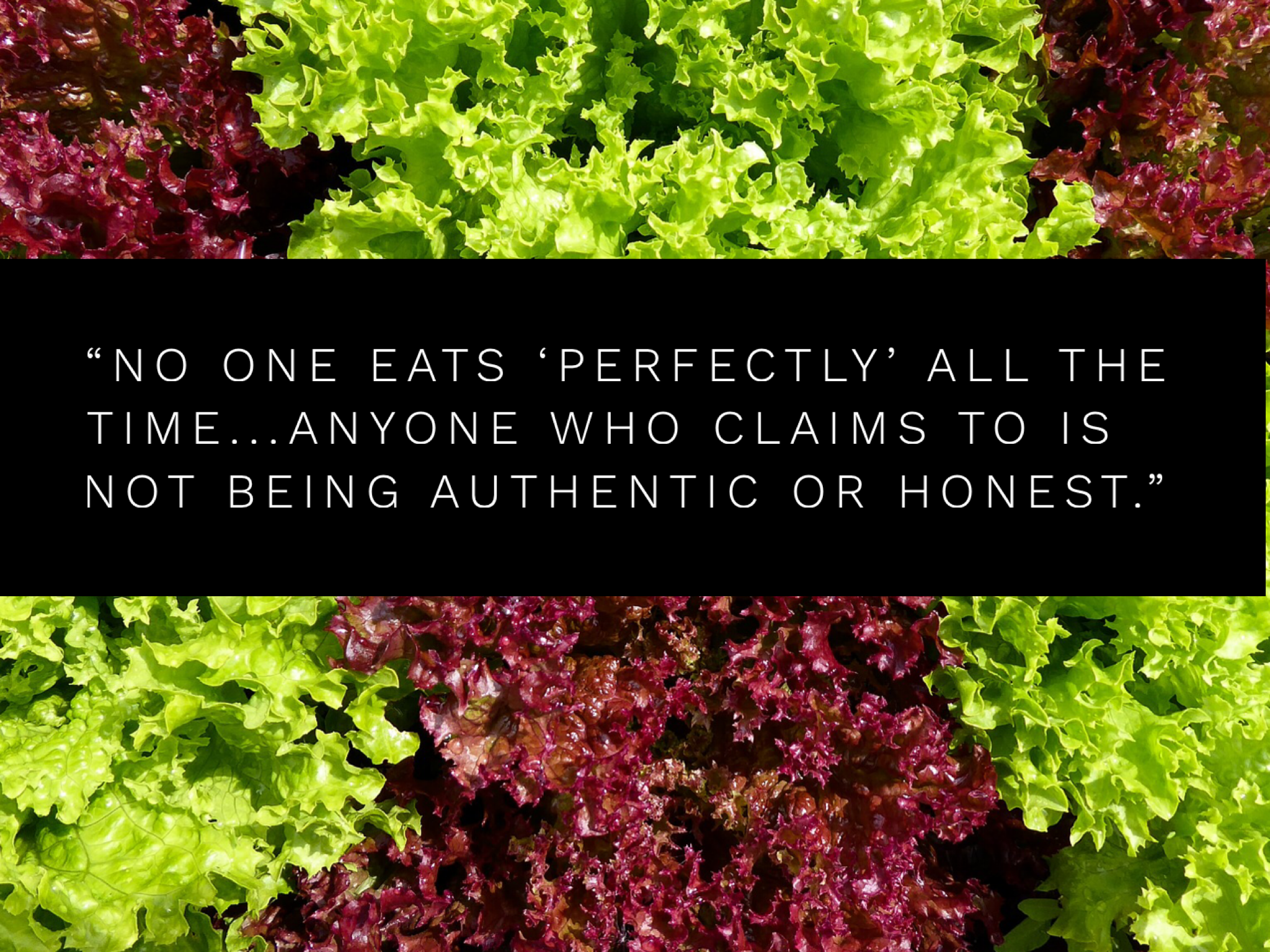 From my experience there are a lot of misperceptions about dietitians/nutritionists and how we and our families eat and live. I often get, Oh you're a Dietitian, of course you eat healthy or oh you're a dietitian, I'm sure you have no problem getting your kids to eat all sorts of fruits and vegetables. There are a lot of assumptions and perceptions that people make that aren't usually true. I thought I would give you a rundown of some and the reality behind them.
From my experience there are a lot of misperceptions about dietitians/nutritionists and how we and our families eat and live. I often get, Oh you're a Dietitian, of course you eat healthy or oh you're a dietitian, I'm sure you have no problem getting your kids to eat all sorts of fruits and vegetables. There are a lot of assumptions and perceptions that people make that aren't usually true. I thought I would give you a rundown of some and the reality behind them.
We (Dietitians/Nutritionists) eat “perfectly”.
This is a resounding NO! As a matter of fact no one eats perfectly all the time – whatever that might look like – and anyone who claims to is not being authentic or honest. In our social media obsessed world it is easy to fall into this mentality of perfection seeking. Despite what is presented on Instagram or what we may think there actually is no perfect way of eating and every body needs something different. The notion that there is some Utopian way of eating usually just makes us feel guilty and inadequate when it comes to our own choices, which is not an encouraging or supportive way of thinking.
I do not eat in a perfect way, but I do listen to my body's cues around food choices and movement and hunger and fullness, eating in a more intuitive way versus a way prescribed by some diet. I listen to my body and what it needs and honor that. I know what feels good to my body and mind and in what quantities and I let that drive my choices most of the time. This is a way of eating called Intuitive Eating that I personally live by and teach to my clients. If you are curious and want to read more about it or take an assessment to help you determine how intuitively you eat check out my website and look for my Intuitive Eating page.
Earlier in my life I did prescribe to diets and quick fix schemes and think their was some holy grail of eating. Thankfully now I am able to see the light and truth and know that diets are not the answer and don’t work long term and that the way to peace with food and eating is letting go of diets and tuning in to what my body needs. It’s possible I promise!
Our kids eat “perfectly”.
Um, this is another NO. I have two very opinionated, strong-willed girls who each have their own food preferences. Often times one will like something I cook and the other won't. I do my best to encourage them to eat in a balanced way and include fruits and vegetables, but that doesn't always happen…and that's ok. I know that they are on their own personal journey with food and if I push too hard they will only push back. Not to say we haven't had our moments where I get frustrated because I have prepared a meal and they turn their nose up at it, but I’ve learned to back off more than push.
As a Mom or parent our good intentions to help our kids choose healthier foods can back fire if we push too hard. Do you like to be forced to do something you don't want to do? Most people don't. Food battles are no fun and can create long-lasting issues around food and eating. I have had many clients sit across from me at the age of 50 or 60 and tell me about how messages they were told around food, and even their body and weight, have stuck with them and created negative issues. A perfect example of this is the whole, you better clean your plate because there are starving children in___________.(you fill in the third world country.) That well intentioned ideology has stuck with many adults who still feel the need to clean their plates, regardless if they are full or not.
The best way to help kids eat well and be active is to model that behavior as their parent or Grandparent. Kids are like sponges and take in everything around them, even when we think we are hiding it well. If we want our kids to grow up to be adults with a healthy relationship with food and their bodies, we need to model that for them.
Our husbands live a miserable existence…because we require perfect eating from them.
This is another NOPE. My husband gets this one all the time. Again, we eat well and for health most of the time, but not all the time. One example is eating out at restaurants. We share meals often not because we have to or because we are on a diet, but because we have learned that what we are served in restaurants is way too much for one person and we feel better when we are satisfied and not stuffed. Ultimately, I feed our family well, providing home cooked meals most nights and keep our pantry and fridge stocked with healthy choices, but don’t rule with an iron fist when it comes to food and let each member of my family, including my husband, make their own decisions about what they will eat and when.
All Dietitians are somehow funded by the food industry and are blind followers of government guidelines.
This is one I see Dietitians being accused of in the Twitter-verse all the time and is frankly absurd. I can promise you I do not receive a penny from any food company. I try my hardest to stay as neutral as I can when making recommendations about certain foods and base those recs on ingredients and health benefits, not marketing. In regards to blindly following government guidelines, I don't do that either. It is my job, and what I think to be a very important one, to know that whatever recommendations I give are rooted in evidence-based information and I take that very seriously. I don't blindly follow any one source and always dig deep to get to what I know to be sound information and advice.
So, there you have it, a few misperceptions that you might have heard or thought of about dietitians and the real truth behind them. Here are a few truths about me personally as a dietitian.
I get goose bumps sometimes when I am counseling clients.
When I am talking with a client and they are able to have an ah-ha moment around food and their eating patterns I am deeply touched. I don't get that same emotional reaction when someone reports weight loss. I am happy for clients when they lose weight because I know it makes them feel good to have accomplished what they set out to do, but it is a different feeling when a client and I are working on root issues of why they have struggled with their weight and/or bodies all their life and they have a light bulb moment about what drives those issues. The most rewarding work I do is not helping people understand carbs or how much protein they need or how many calories, but instead helping people develop a healthier relationship with food and their bodies and change their diet/weight loss at all cost mentality to one of self care and health and start to enjoy food and trust their bodies again.
I truly believe that food and movement is medicine.
Eating whole, real food most of the time not only has the power to prevent many of the diseases our society is plagued with, but just simply can make us feel better both mentally and physically.
The same is true for moving our bodies regularly. We are meant to move and movement has countless benefits. Many people get overly caught up in how much they need to be doing and what type and forget just to look for what they enjoy and will stick with. As is true with nutrition and food, if we get too caught up in the numbers of movement I believe it diminishes our enjoyment and makes it less sustainable for the long term.
The diet mentality and diet industry do WAY more harm than good.
This is something I believe at my core, see it time and again with clients, and has been shown in multiple studies. Dieting and an obsessive focus on weight creates unnecessary anxiety and stress and has deleterious effects on both our physical and emotional health.
Potential adverse effects of dieting include:
• Eating disorder or disordered eating
• Binge eating
• Malnutrition
• Depression
• Lower self-esteem
• Increased stress and cortisol (stress hormone) response
• Weight cycling (losing weight just to regain it plus some…over and over again)
Despite this fact many of us jump from one diet to the next searching for the magic answer, only to lose and re-gain the same weight over and over again. So, what IS the answer then? The answer is a different approach, taking focus off of weight and putting it on health and self-care. This notion is so foreign to our diet-obsessed culture that it can be difficult to even consider, but just think of how liberating it would be to consider a different approach than the one maybe you, like so many others, have tried countless times to no avail.
I feel best and am my best self when I follow my own advice and live according to my values.
Doing things like incorporating movement daily, eating following the Intuitive Eating principles I teach, getting enough sleep, drinking alcohol in moderation, doing things to lower my stress level, and spending time enjoying life is important to me. I haven't always lived this way, but fortunately have learned both personally and professionally that these are the principles of wellness that support my values of health and well-being and that work for me.
What do you value? Are you living in a way that is true to those values? I truly enjoy helping clients find their own principles of wellness and guiding them on their own path.
Misperceptions and assumptions are hard to change I realize, but I’m hopeful now you might have a different take on Dietitians and the way we live and think. I, nor my family eat perfectly and I don’t expect that of my clients either. The more we can abolish the idea of perfect eating the better off we all will be.

0 Comments